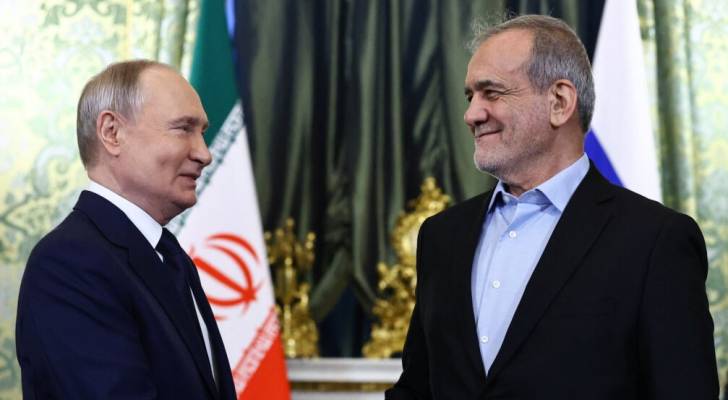Russian President Vladimir Putin and Iranian President Masoud Pezeshkian shake hands during a meeting at the Kremlin in Moscow on January 17, 2025.
Russia, Iran officially implement "comprehensive strategic partnership" treaty
Russia and Iran have officially implemented their "Comprehensive Strategic Partnership" treaty, a landmark agreement signaling a deepening alliance that analysts say could significantly reshape geopolitical dynamics in the Middle East and beyond.
The formal implementation was announced today, Friday, following an exchange of instruments of ratification between the two nations.
The treaty, signed in January, covers a broad range of cooperation, extending beyond military and economic ties to include political, cultural, and security dimensions. Russian President Vladimir Putin and Iranian President Ebrahim Raisi had previously lauded the agreement as a testament to their shared commitment to a "multipolar world order" and a counterweight to Western influence.
Key Pillars of the Partnership
While the full text of the treaty has not been publicly disclosed in its entirety, official statements and reporting from sources like TASS, IRNA, and Reuters indicate several key areas of cooperation:
- Military-Technical Cooperation: This is a cornerstone of the agreement, expected to include arms sales, joint military exercises, and intelligence sharing. Both countries are under Western sanctions, which has pushed them towards greater military interdependence. Iran has already supplied Russia with drones used in Ukraine, and Russia is reportedly supplying Iran with advanced military technology.
- Economic Ties: The treaty aims to boost bilateral trade, energy cooperation (including oil and gas projects), and joint ventures in infrastructure development. Both nations are seeking to bypass Western sanctions through alternative trade routes and financial mechanisms.
- Political and Diplomatic Coordination: Russia and Iran plan to coordinate their foreign policies more closely, particularly on regional issues in the Middle East, Central Asia, and the Caucasus. This includes shared stances on the Syrian conflict, where they both support the Assad regime, and a mutual opposition to US influence in the region.
- Security Cooperation: This includes collaboration on counter-terrorism, cybersecurity, and information security, aimed at protecting both states from external threats and interference.
- Cultural and Educational Exchange: The treaty also fosters cooperation in education, science, and cultural initiatives to strengthen ties between their societies.
Geopolitical Implications
The formalization of this strategic partnership has significant geopolitical implications:
- Challenge to Western Influence: It reinforces a growing anti-Western bloc, particularly as both countries seek to reduce their reliance on the US dollar and Western-dominated institutions.
- Middle East Dynamics: The alliance could deepen Russia's role in the Middle East and complicate Western diplomatic efforts in the region, particularly concerning the Israeli Occupation of Palestine and Iran's nuclear program.
- Ukraine War: Enhanced military cooperation between Russia and Iran could further impact the war in Ukraine, with implications for arms supplies and intelligence sharing.
Western intelligence agencies and governments are closely monitoring the implementation of this treaty, viewing it as a move that could destabilize global security and undermine efforts to promote international norms.




